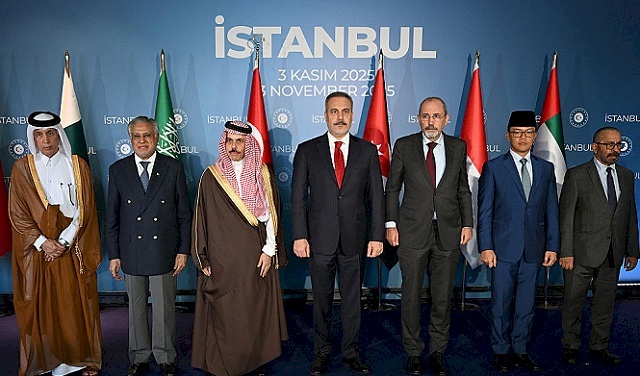
Istanbul Meeting Rejects Any Guardianship Over Gaza: Governance for Palestinians
SadaNews - Arab and Muslim foreign ministers emphasized during a meeting held in Istanbul on Monday to discuss the future of the Gaza Strip, the necessity that governance in the region remains solely in the hands of the Palestinians, rejecting any "new guardianship regime" over it.
The Turkish Foreign Minister, Hakan Fidan, stated in a press conference after the meeting, which included his counterparts from Saudi Arabia, Qatar, the UAE, Jordan, Pakistan, and Indonesia, that "the Palestinians must govern themselves and ensure their own security."
He added that "Gaza needs reconstruction, and its residents must return to their homes. It needs to heal its wounds, but... no one wants to see the emergence of a new guardianship regime." He noted that "any action taken to resolve the Palestinian issue should not create a basis for new problems."
Fidan expressed hope for a "quick internal Palestinian reconciliation" between Hamas and the Palestinian Authority led by Mahmoud Abbas, indicating that this reconciliation would "enhance Palestine’s representation within the international community."
The leaders of these seven countries, members of the Organization of Islamic Cooperation, had met with U.S. President Donald Trump in late September on the sidelines of the United Nations General Assembly in New York.
Days later, Trump revealed his plan based upon which a cease-fire agreement between Israel and Hamas was reached to stop the genocide being carried out by Israel against the strip since October 7, 2023.
In a speech at the Permanent Committee for Economic and Commercial Cooperation in the Organization of Islamic Cooperation, Turkish President Recep Tayyip Erdoğan stated that Hamas "appears determined to respect the agreement, while Israel’s record in this regard is extremely poor."
Erdoğan added, "At this stage, we need to provide more humanitarian aid to the people of Gaza, and then begin reconstruction efforts (...). The Israeli government is doing everything it can to prevent this," expressing hope that the Organization of Islamic Cooperation would play a "driving role" in the reconstruction.
The Turkish Foreign Minister indicated that before the ministerial meeting, he met on Saturday with a delegation from the political bureau of Hamas, headed by its chief negotiator, Khalil al-Hayya. He explained that establishing an international stabilization force in Gaza "will take time."
He added, "First, a consensus must be reached on the project, and then obtain approval from the United Nations Security Council without facing any veto from the permanent members," referring to the United States.
Turkey shows a desire to participate in the international force to be deployed in the region, but Israeli officials have repeatedly expressed their refusal of this participation, while Israel rejects any role for Ankara in Gaza.
Turkey is intensifying its diplomatic communications in the region in an attempt to modify the U.S. stance supporting Israel despite its ongoing violations of the cease-fire, especially in light of Ankara's relationship with Hamas leadership.
Trump's plan, consisting of twenty points, calls for the establishment of a "temporary international stabilization force" to be deployed immediately in Gaza, to provide training and support for an "approved" Palestinian police force, aiming to ensure stability in the region alongside the gradual withdrawal of the Israeli army, and this force would include elements from Arab and Muslim countries.
In contrast, Israeli Foreign Minister Gidion Sa'ar insisted that participation in the international force should be limited to countries deemed "neutral" by Israel, in statements he made on Sunday.
Sa'ar stated, "Perhaps they shouldn't have to be pro-Israel, but they shouldn't be anti-Israel either," adding that "Turkey, unfortunately, under Erdoğan's leadership, has adopted a hostile approach towards Israel, not limited to statements but also including diplomatic and economic steps against it."
In an additional indicator of the tension between Ankara and Tel Aviv over Gaza, a Turkish relief team sent to search for the bodies of Palestinians and Israelis in the region has been waiting for days for permission to cross from the Rafah crossing into Gaza.

How will the financial markets and stock exchanges open the first session after the strike...

Health: Martyr Succumbs to Injuries from Occupation Bullets in Dora

How Did America Clone Iran's Weapon to Strike Tehran?

Iran.. "Triumvirate Transitional Administration" After Khamenei's Death

Iran Announces Launch of New Attacks on Israel and American Bases

Trump's New Warning to Iran: It Will Face Unprecedented Force

Weather: Cold Conditions with a Chance of Light Rain

